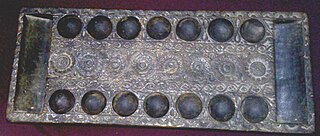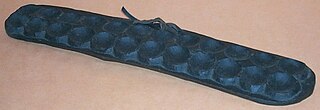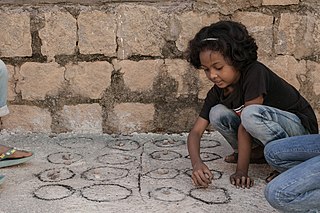Related Research Articles

Mancala refers to a family of two-player turn-based strategy board games played with small stones, beans, or seeds and rows of holes or pits in the earth, a board or other playing surface. The objective is usually to capture all or some set of the opponent's pieces.

Kalah is a modern variation in the ancient Mancala family of games, the oldest known version having been found carved into a stone tablet in the 16th-century BCE pyramid of Cheops. The Kalah variation was developed in the United States by William Julius Champion, Jr. in 1940. This game is sometimes also called "Kalahari", possibly by false etymology from the Kalahari desert in Namibia.

Omweso is the traditional mancala game of the Ugandan people. The game was supposedly introduced by the Bachwezi people of the ancient Bunyoro-kitara empire of Uganda. Nowadays the game is dominated by Ugandan villagers. It is a very hard and fast game said to keep one's mind high and ever excited, which can make it addictive. The equipment needed for the game is essentially the same as that of the Bao game. Omweso is strictly related to a wide family of mancalas found in eastern and southern Africa; these include Coro in the Lango region of Uganda, Aweet in Sudan, ǁHus in Namibia, Kombe in Lamu (Kenya), Mongale in Mombasa (Kenya), Mongola in Congo, Igisoro in Rwanda, and Kiela in Angola.

Bao is a traditional mancala board game played in most of East Africa including Kenya, Rwanda, Tanzania, Comoros, Malawi, as well as some areas of DR Congo and Burundi. It is most popular among the Swahili people of Tanzania and Kenya; the name itself "Bao" is the Swahili word for "board" or "board game". In Tanzania, and especially Zanzibar, a "bao master" is held in high respect. In Malawi, a close variant of the game is known as Bawo, which is the Yao equivalent of the Swahili name.

Owela, also referred to by the Khoekhoe language loanword ǁHus, is the Oshiwambo name of a traditional mancala board game played by the Nama people, Herero people, Rukwangali speakers, and other ethnic groups from Namibia. It is related to the Omweso family of mancala games played in Eastern and Southern Africa. Although this is an abstract strategy game, the consequences of individual moves are so hard to predict that it can be considered, to some extent, a game of chance.

Igisoro is a two-player variant of the mancala family. It is a variant of the Omweso game of the Baganda people (Uganda), and it is played primarily in Burundi and Rwanda. Igisoro, like Omweso and other mancalas from Eastern Africa such as Bao (game), is played with a 4×8 board of pits and 64 seeds. A player's territory is the two rows of pits closest to them.

Ali Guli Mane is an abstract strategy board game of the mancala family, from Karnataka in South India. It is known as Chenne Mane in Tulunaadu, Akal Patta in North Karnataka and Satkoli (सत्कोलि) in Maharashtra. The name of the game, like that of many mancala games across the world, is simply a description of the board used: it means a "wooden block with holes". It is similar to Pallanguzhi from the neighbouring state of Tamil Nadu. There are also similarities with the traditional Malay mancala game Congkak.
Alexander Johan de Voogt or simply Alex de Voogt is a Dutch researcher and associate professor at Drew University, who worked as a curator of African Ethnology at the American Museum of Natural History and best known for his work on the history and distribution of traditional mancala games. He is also editor of Board Game Studies, the main scientific journal on the history of board games.
Andada is a traditional mancala game played by the Kunama people of western Eritrea. It closely resembles other mancalas from East Africa such as Enkeshui and Layli Goobalay.

Ayo is a traditional mancala played by the Yoruba people in Nigeria. It is very close to the Oware game that spread to the Americas with the atlantic slave trade. Among modern mancalas, which are most often derived from Warri, the Kalah is a notable one that has essentially the same rules as Ayo.

Enkeshui is a traditional mancala game played by the Maasai of both Kenya and Tanzania. It is a rather complex mancala game, and bears some similarities to the Layli Goobalay mancala played in Somaliland.
Isolo is a traditional mancala game played by the Sukuma people in northern Tanzania. The rules of the game come in three variants, respectively for women, boys and men.

Katro is a traditional mancala game played by the Betsileo people in the Fianarantsoa Province of Madagascar. The game was first described by Alex de Voogt in 1998.
Kiothi is a traditional mancala game played by the Meru people in Kenya. The word "kiothi" simply means "to place". This mancala is closely related to the Enkeshui and the Giuthi mancalas, respectively played by the Maasai, the Kikuyu and Embu people.

Kisolo is a traditional mancala game played by the Luba, Lulua and Songye peoples of DR Congo, Zambia and Zimbabwe. It is closely related to other East African mancalas such as Bao, Bao Kiarabu, Coro and Isolo.
Krur is a traditional mancala game played by the Hassaniya people in western Sahara, along the border of Nigeria and Mauritania, in southern Morocco, in Algeria, in northern Senegal, in Mali and in Niger. It is a children's game, very close to other simple African mancala such as Layli Goobalay (Somalia) and Nsa Isong (Nigeria).
Lamlameta is a traditional mancala game played by the Konso people living in the Olanta area of central Ethiopia. It was first described in 1971 by British academic Richard Pankhurst. It is usually played by men. The name "Lamlaleta" means "in couples".

Layli Goobalay is a board game played in parts of Somalia. It is a variant of the classical count and capture game mancala, which is one of the oldest two-player strategy board games played throughout the world. Layli Goobalay means "to exercise with circles" in the Somali language.
Mbothe is a traditional mancala game played by the Pokomo people that live along the Tana River, in Kenya. Pokomo do not traditionally build gameboards; they dig pits in the ground and use small stones as counters.

Tsoro is an ancient two-player mathematical strategy board game that has been played for over a thousand years. It has its roots in Zimbabwe and was first described in literature by J. B. Matthews in 1964. Tsoro belongs to the same class of African strategy board games collectively called Mancala, such as Oware, Bao, and Kalah.
References
- Hyde, T. 1694. De Ludis Orientalibus Libri Duo. Oxford, p. 232.
- Ingrams, W. H. 1921. Zanzibar: Its History and its People. Frank Cass & Co., London, p. 257.
- Murray, H. J. R. 1952. A History of Board-Games other than Chess. Oxford, pp. 207–208.
- Romariz Santos Silva, E. 1995. Jogos de quadrícula do tipo mancala com especial incidência nos praticados em Angola. Lisboa.
- Russ, L. 2000. The complete Mancala Games Book. New York.
- Voogt, A. J. de 2003. Hawalis in Oman: a first Account of Expertise and Dispersal of four-row Mancala in the Middle East. In: Board Game Studies, n. 6, pp. 95–98.